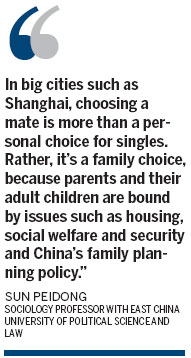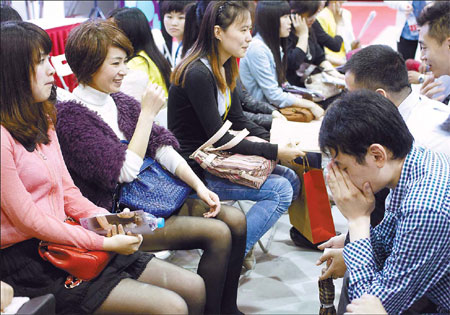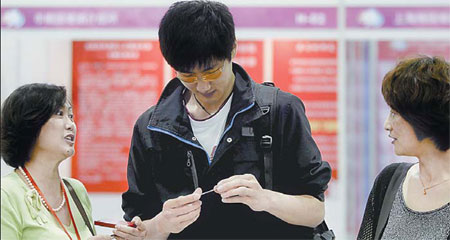Eager parents quick to learn marriage lines
Updated: 2013-05-22 07:50
By Shi Yingying (China Daily)
|
||||||||
|
Young people hoping to find their 'better half' attend Shanghai's biggest matchmaking party, which was held in the city's Qingpu district on Saturday and Sunday. Gao Erqiang / China Daily |
|
Agency employees urge a young man to register with their company at the weekend's matchmaking event. Zhang Dong / for China Daily |

Finding the perfect partner can be a family affair for many in China, as Shi Yingying reports in Shanghai.
On Saturday afternoon, an unsuspecting Wang Liwei was surrounded by 12 middle-aged women, mostly from Shanghai, in search of husbands for their daughters. Wang was in the middle of Shanghai's biggest matchmaking party, held in the city's Qingbu district.
Advertisements for the event promised the 28-year-old Shandong native an unparalleled opportunity to find his perfect partner, as more than 18,000 singles would be attending.
"But I never imagined anything like this - compared with the number of contacts I've made with young women, I've given out my number to many more of these desperate mothers who are hunting for son-in-laws, even though I tried my best to turn them away as politely as possible," said Wang, who works in information technology.
He said he was so overwhelmed by middle-aged women that he was afraid of running out of time to find the right girl.
Wearing wide smiles, the women badgered Wang about his age, profession, income, whether he owns an apartment in Shanghai, and which side of the city his property is located - Pudong or Puxi?
"Even though they'd murmur that I'm too young for their daughter once they knew my age, they still insisted I write down my number. Why don't parents encourage or bring their grown-up children with them, rather than date on their behalf?" wondered Wang.
Unconventional approach
Well, they do. But when their bashful offspring are too shy to approach a potential partner, eager Chinese parents decide to step in and help in their own way.
"My daughter is waiting outside the gate. She feels embarrassing because I'm too well-prepared for the event," said Lu Fang, 67, referring to the long plastic banner he'd set up in the center of the venue, which displayed personal information about his daughter, a 40-year-old doctor at Shanghai's Huashan Hospital.
Her ideal prospective groom is a "responsible man with stable income" and who ideally "owns an apartment and a car".
Lu was concerned: "My daughter actually holds a master's degree but I didn't use that information because I was worried it might scare off men with lower educational backgrounds. I just wrote that she has a bachelor's degree, so hopefully more men will approach us."
He said some of the young women in the venue had noticed his unconventional approach and copied the idea, writing their personal information on an A4 sheet of paper and hanging it out for all to see.
"Unlike me, they immediately attracted the attention of a few men," said Lu, his face etched with anxiety.
According to Zhou Juemin, president of Shanghai Matchmaking Agency Management Association, which organized the event, out of every 100 attendees, there were 46 men and 54 women.
Zhou called the disparity "a big relief" because "we don't have to limit the number of female participants and there's been no need to mobilize male members from matchmaking agencies in our association to even up the gender gap".
Up until last year, the organizers of events of this nature agonized over the uneven gender split. There were six females for every four males at the 2011 event, which attracted 10,000 singles.
"We rejected more than 100 girls from our outdoor matchmaking activities for 1,000 singles in 2012, but tried our best to lure single males from companies such as Baosteel and Shanghai Urban Construction Group," said Tang Weili, office director with the organizer of the 2012 event, Shanghai Matchmaking Agency Management Association.
That event saw the number of young men boasting a conventional "good job" - defined as working at a large, State-owned company - was less than half the intended number as organizers attempted to even up the gender distribution.
Women were charged an entry fee of 100 yuan ($16), but the men's tickets were paid for by their labor unions to encourage them to attend.
Data from the National Bureau of Statistics shows that the number of men aged 30 or under outstrips women in the same age group by around 20 million. Approximately one in five women aged 25 to 29 is unmarried, while the proportion of unmarried men of equal age is around one-third higher.
"But that doesn't mean they will easily match up, because Chinese men tend to 'marry down', both in terms of age and educational achievement," said Zhou Xiaopeng, a national-level marriage and family counselor, who is also a consultant for the popular dating website Baihe.
"Women tend to have a stronger sense of emotional need, compared with men, especially women aged 30 and older. The pressure to become a wife and mother comes from their family or society," said Zhou.
She added that both males and females have a physiological requirement: "More than 70 percent of singles told me during consultation that they have sexual partners, but once that need has been met, women still long for marriage. Men, however, regard it as something attached to the provision of material goods, which can result in mental stress."
'Most desperate corner'
Outside the venue for the Shanghai event, there was a strong sense of desperation as lines of parents flocked to the lane next to the entrance, and - baulking at the entrance fee - exchanged notes on their progress.
This impromptu matchmaking market is an extension of Shanghai's People's Park, or "the most desperate corner" as it's been dubbed by Web users.
The city-center park is Shanghai's top matchmaking haunt at weekends, a place where parents present information about their unmarried sons and daughters in interesting and innovative ways.
Details such as age, height, educational background, profession, income and what their children are looking for in their partners are inscribed on A4 sheets of paper, which are then slipped into clear plastic folders and displayed on high objects or hung from tree branches. However, no photos are shown until a parent expresses a serious interest.
Sun Peidong, a sociology professor with East China University of Political Science and Law, was confused that the format was so popular, despite its low success rate, before she chose the spot for a field study and spent almost a year interviewing more than 40 "desperate" parents aged between 48 and 73.
"In big cities such as Shanghai, choosing a mate is more than a personal choice for singles. Rather, it's a family choice, because parents and their adult children are bound by issues such as housing, social welfare and security and China's family planning policy," said Sun.
"For example, Chinese parents are insecure about the social safety net, including pensions and health care, as the country's current welfare and security system can't take good care of them, and so their only child needs to do the job instead," she said. "Therefore, picking a son- or daughter-in-law is like purchasing reliable life insurance for the future of their children and themselves. They want to upgrade their children's lives by finding the perfect better half."
Yin Peiyong, 65, a frequent visitor to People's Park, admitted that many other parents back off when they hear that his son only earns 5,000 yuan a month. "They think it's too little and inevitably focus more on material issues such as income and housing, rather than personality and temperament," he said.
'As cool as going to bars'
Back at the matchmaking party, Xu Meng giggled when a man took the initiative to strike up a conversation. However, he turned away on learning that she's just 22.
"He said I'm too young for him. But to be honest, I didn't come to find a 'future husband', it's just fun to attend an event like this," said the Anhui province native, who works as a software test engineer in Shanghai.
"The media also seems to give the message that we need to hurry up and find 'Mr Right', otherwise, we'll become 'leftovers' in few years, and that stings," said Xu, who explained that she'd attended to see what was available "in the market".
Xu was not the only person from the post-1990 generation hunting for novelty at the venue. Her view was shared by 20-something Nicholas Torres from the United States.
"It's as cool as going to bars," he said, as he took a break from a series of eight-minute "speed dates" during which he spoken to six girls.
Torres, who studies in Shanghai, organized a trip to the event and invited three Japanese friends - also exchange students - plus some Chinese friends to act as "tour guides".
However, just as the post-1990 generation and expats have started to embrace the matchmaking concept, some slightly older, unmarried Chinese women are rejecting the idea and are happy just being single.
Qian Wentao, 30, a confident, personable woman who earns a good salary, has her own apartment and holds a master's degree from an overseas university, said being single at her age isn't half bad. "If I'm happy with my life right now, why bother to go on blind dates to find a so-called 'better half' who may lower my current standard of living?" asked the Shanghai hotel executive.
A believer in the theory that A-grade guys will find B-grade women, B-grade guys will find C-grade women and C-grade men will find D-grade women, Qian said all that's left are A-quality women and D-quality men.
"Therefore, I'm proud to be a 'leftover', but the term 'leftover' is disrespectful. To make it worse, the media aggressively disseminates this idea in all kinds of reports and surveys, putting pressure on us indirectly," she said.
Qian said she'd love to meet the right guy, but believes that will happen when it happens and there's no need to set a deadline to hurry things along.
Contact the writer at shiyingying@chinadaily.com.cn
(China Daily 05/22/2013 page6)

 Michelle lays roses at site along Berlin Wall
Michelle lays roses at site along Berlin Wall
 Historic space lecture in Tiangong-1 commences
Historic space lecture in Tiangong-1 commences
 'Sopranos' Star James Gandolfini dead at 51
'Sopranos' Star James Gandolfini dead at 51
 UN: Number of refugees hits 18-year high
UN: Number of refugees hits 18-year high
 Slide: Jet exercises from aircraft carrier
Slide: Jet exercises from aircraft carrier
 Talks establish fishery hotline
Talks establish fishery hotline
 Foreign buyers eye Chinese drones
Foreign buyers eye Chinese drones
 UN chief hails China's peacekeepers
UN chief hails China's peacekeepers
Most Viewed
Editor's Picks

|

|

|

|

|

|
Today's Top News
Shenzhou X astronaut gives lecture today
US told to reassess duties on Chinese paper
Chinese seek greater share of satellite market
Russia rejects Obama's nuke cut proposal
US immigration bill sees Senate breakthrough
Brazilian cities revoke fare hikes
Moody's warns on China's local govt debt
Air quality in major cities drops in May
US Weekly

|

|









